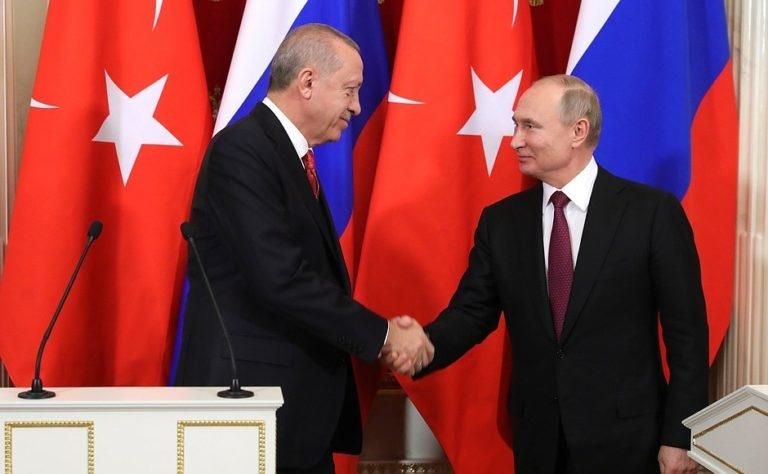Putin’s Firewall Around Russia-Turkey Partnership

(Russian President Vladimir Putin (R) and Turkish President Recep Erdogan following joint press conference at the Kremlin, Moscow, Jan 23, 2019)
The much-awaited meeting between Russian President Vladimir Putin and his visiting Turkish counterpart Recep Erdogan in Moscow last Wednesday focused on the withdrawal of US troops from Syria. The timeframe of the US drawdown or its scope and directions remain far from clear. Meanwhile, attention is riveted on creating a buffer zone in northern Syria, 32 kilometre wide along the Turkish border, which is under discussion presently between Washington and Ankara.
The US special representative on Syria James Jeffrey is expected in Ankara in coming days to carry forward the discussions. From present indications, US may control the airspace over the proposed zone and maintain some sort of presence on the ground as well while Ankara has been maintaining that it has the capability to enforce the zone.
Russia, on the other hand, has consistently voiced its opinion favoring Syrian government control over the regions vacated by the US. Indeed, Syrian leadership also has reiterated its determination to regain control over the entire country.
Thus, the meeting in Moscow on Wednesday took place in a surcharged atmosphere amidst speculation that the Russia-Turkey partnership might get rocky. The US never liked the Astana process on Syria between Russia, Turkey and Iran and the American intentions in baiting Turkey with the buffer zone proposal are highly suspect.
If good diplomacy is about showing tact in handling awkward situations while brilliant diplomacy lies in creating a pathway through a minefield, Putin was probably at his optimal best in navigating the Russian-Turkish partnership out of the reach of the American tentacles. Putin’s remarks after the talks with Erdogan once again underscored that in the Russian estimation, any foreign presence on Syrian soil will lack “international legal grounds” if it is not on the basis of an invitation from Damascus or emanating out of a decision of the UN Security Council. He was specifically referring to the US occupation of Syria. But having said that, Putin qualified that “constructive cooperation” nonetheless becomes necessary even with such partners whose presence in Syria may lack legitimacy. Importantly, Putin added that Russia respects Turkey’s security interests. Then he went on to spring a big surprise:
“And the third. The 1998 treaty between the Syrian Arab Republic and the Republic of Turkey is still valid, and it deals specifically with the fight against terrorism. I think this is the legal framework that covers many issues relating to ensuring Turkey’s security on its southern borders. Today we have been discussing this issue thoroughly and intensively enough.”
This needs some explaining. Putin was referring to the Adana Accord of October 1998 between Turkey and Syria regarding cooperation in combating terrorism, which became moribund through the 7-year Syrian conflict. Putin said the agreement “is still valid”, which of course was tantamount to saying that Damascus (and, presumably, Tehran) thought so, too. (By the way, in 2003, Iran too had endorsed the Adana Accord.)
In effect, Putin has suggested that the Adana Accord, which was forged under Egyptian-Iranian mediation following a nasty confrontation between Ankara and Damascus over the Kurdish PKK’s activities and presence in Syria, could still serve as the legal and political framework for securing the Turkish-Syrian border to combat terrorism. The Russian Foreign Minister Sergey Lavrov since amplified Putin’s remark further in media comments on Saturday. While on a visit to Rabat, Lavrov said, “The Adana agreement of 1998 was concluded between Turkey and Syria, its essence is to eliminate Turkey’s concerns about its security. [Syria] entered into this agreement, assuming certain obligations, and we proceed from the assumption that this agreement remains in force. As I understand, so do the state parties to the agreement.”
That is to say, Putin’s proposal offers an alternative to a Turkish occupation of Syrian territory – or involving a joint operation with the US to create a safe zone inside Syria and to enforce it militarily. The Adana Accord states that Syria is committed to eliminate any activity on its territory that would jeopardize Turkey’s security, including “the supply of weapons, logistic material, financial support to and propaganda activities” of Kurdish groups affiliated to the PKK. (The Syrian and Turkish foreign ministers signed an updated treaty in 2010.)
However, there is a caveat here. In order for the Adana Accord to come alive and fully satisfy Turkey’s security needs on the border region with Syria (which used to be the case till 2011 when Turkey became the staging ground for the US-led project to overthrow the Syrian government), Ankara must resuscitate its contacts with Damascus. Simply put, Putin is nudging Erdogan to restore ties with Syrian President Bashar al-Assad. After all, under Adana Accord, Syria is committed to protect Turkey’s security, but that obligation is also “on the basis of the principle of reciprocity.”
Interestingly, on Saturday, Syrian state news agency SANA quoted a foreign ministry official in Damascus as saying, “Syria confirms that it is in compliance with the Adana Interstate Agreement on Combating Terrorism in all its forms and all agreements related to it, but the Turkish regime has been violating the agreement since 2011 up to now by sponsoring and supporting terrorism, training militants and making it easier for them to go to SAR (Syrian Arab Republic), or through the occupation of Syrian territories with terrorist groups it controls it or directly with the help of the Turkish Armed Forces.” Furthermore, SANA reported the Syrian Foreign Ministry as calling on Turkey to “activate” the Adana Accord, leaving the boundary as it used to be before the beginning of the war in 2011.
Clearly, an inflection point has come. Erdogan has a big decision to make regarding the Turkish strategy in the aftermath of any US withdrawal from Syria. Clearly, this is not only an issue of the security of Syria’s northern region but also about Syria’s unity, territorial integrity and above all the need of a durable, inclusive, negotiated Syrian settlement where the future trajectory of Turkish-Syrian good neighborly relations is a crucial prerequisite to peace and regional security. Putin’s goal is to encourage Erdogan to work with Assad, while also taking care to preserve the verve of the Russian-Turkish cooperation and accelerate the Syrian peace process in Geneva. But in the process, he also may have drawn attention to the inadequacy and male fide intentions of the western powers occupying northern Syria – US, France and Germany, in particular.
On the ground, this translates as the Astana partners – Russia, Turkey and Iran – taking in hand the task of coordinated efforts aimed at establishing another de-escalation zone in northern Syria following the US withdrawal. It appears Putin has made an offer Erdogan cannot easily refuse and which may even be the latter’s own preferred option. Significantly, Erdogan has hit out hard against the coup attempt by Washington to overthrow the Venezuelan government.
Get the latest reports & analysis with people's perspective on Protests, movements & deep analytical videos, discussions of the current affairs in your Telegram app. Subscribe to NewsClick's Telegram channel & get Real-Time updates on stories, as they get published on our website.























